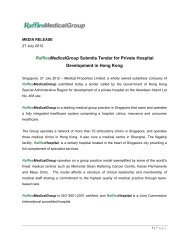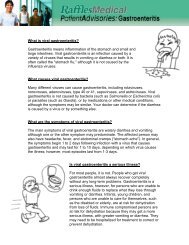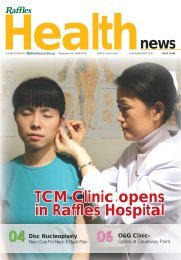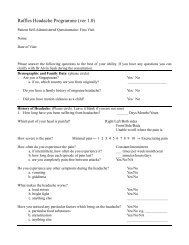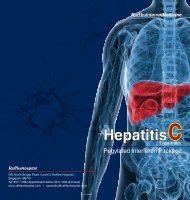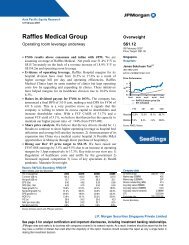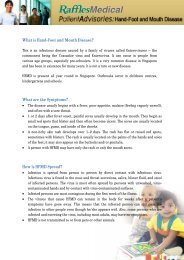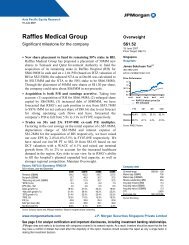REGISTRATION No. 198901967K MICA (P) - Raffles Medical Group
REGISTRATION No. 198901967K MICA (P) - Raffles Medical Group
REGISTRATION No. 198901967K MICA (P) - Raffles Medical Group
You also want an ePaper? Increase the reach of your titles
YUMPU automatically turns print PDFs into web optimized ePapers that Google loves.
<strong>Raffles</strong> HealthNews Feature 13<br />
“Before flying off, it is a good practice to read up on your holiday destination”, says Dr<br />
Leong Hoe Nam, Specialist in Infection Disease at <strong>Raffles</strong> Internal Medicine Centre. Is<br />
there an influenza outbreak this month Is malaria a problem in the area you are visiting<br />
Springtime may be lovely to the eyes but it also means that pollen is everywhere; a<br />
potential problem for those who may be allergic to it.<br />
If you have allergies or reactions to certain medications, foods, insect bites, or other unique<br />
medical problems, consider getting a medical identification tag. You may also wish to carry<br />
a letter from your physician explaining required treatment should you become ill.<br />
On the same thread, read up on health alerts on the country. Dr Leong recommends visiting<br />
the World Health Organization’s website (http://www.who.int/ith/en/) which details health<br />
risks for travellers. The Centers for Disease Control and Prevention (http://wwwnc.cdc.<br />
gov/travel/) is another resourceful site advising the risks of different types of infection at the<br />
destination.<br />
Alternatively, you can speak to your doctor who can advise you on travel health precautions<br />
based on your current health status.<br />
2<br />
Research on<br />
your destination<br />
3<br />
Be prepared<br />
Armed with the knowledge on your holiday destination, you can then prepare yourself with appropriate vaccinations, medications and other<br />
resources.<br />
A good way to start is to consult your doctor. Find out what are the common ailments in your destination or if there are any outbreaks. Get<br />
the vaccinations you need to protect yourself from diseases such as influenza and typhoid.<br />
For nagging ailments such as gastritis, travel sickness, allergy, and sinusitis, Dr Tan Hsiang Lung, Senior Family Physician at<br />
<strong>Raffles</strong> <strong>Medical</strong>, suggests that you pack medications for them before your trip. “These minor ailments can spoil your holiday.<br />
Do take note that some medications may take time to take effect, so you may want to pre-empt these problems by medicating<br />
before they occur.” A good example is taking your motion sickness pill before the long bumpy bus ride.<br />
“If you have an existing medical condition or medication allergy, you are encouraged to travel with a letter from your physician describing<br />
your health condition and the generic name of the medications that you are taking and cannot take,” advised Dr Tan. For countries where<br />
language may be a problem, you may wish to get the letter translated.<br />
It may also be prudent to pack a small first aid kit including charcoal pills, paracetamol, antihistamine, and plasters for the unexpected.



